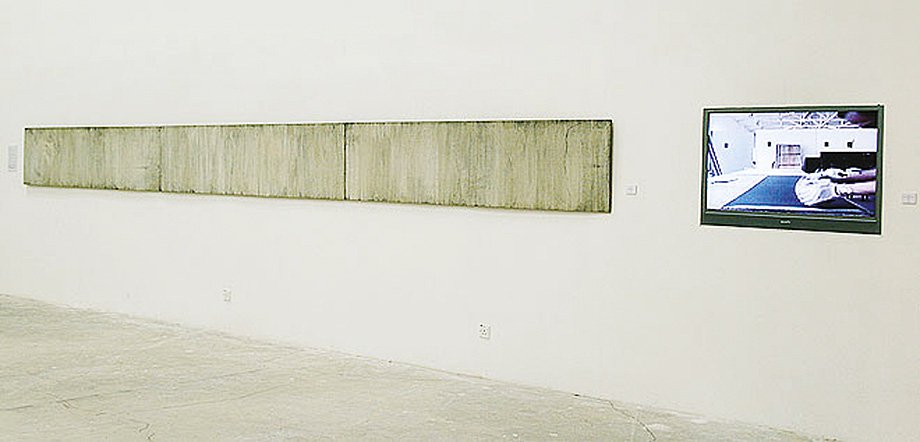Cultural Center of the Philippines
ENCYCLOPEDIA OF
PHILIPPINE ART
Argument from Nowhere
2000 / Three-panel skull on sandpaper work mounted on wood / 59 x 243 cm each / Video installation / Artist: Alvin Zafra
The monochromatic work that constitutes the physical object in this process-based piece of Zafra is often superficially taken as merely a run-of-the-mill minimalist painting. More committed viewers, however, are subtly but quickly clued into the presence of a video playing next to the panels. The video consists of footage of the artist grinding down a human skull and in the process marking off the sandpaper surface with the skull’s granular remains in a long-drawn and what the artist regards as “meditative” process. Initially produced as Zafra’s undergraduate thesis at the University of the Philippines College of Fine Arts, Argument from Nowhere eventually went on to be shown at the Mori Art Museum exhibition Medicine and Art: Imagining the Future for Art and Love in Tokyo, 2010. The work was also previously shown at Futuramanila in Osage, Hong Kong, 2008, and has since been succeeded by other more representational iterations of the artist’s painstaking pulverizing of objects (such as bullets, overgrown finger nails, a bolo, among others) against abrasive surfaces (like sandpaper) as his practice continues to challenge what constitutes painting but broadens what makes up pigment and ground.
The performative aspect of Zafra’s work mode has also brought to light just how critical awareness or familiarity with the artist’s process becomes in extending meanings that become appended to works of this unconventional nature. Additionally, it also questions such vaunted modernist premises as medium specificity and the still persistent claim that the object can and should be regarded as existing in isolation, apart from physical and social conditions enabling its production, circulation, and reception. The work predictably raises questions surrounding the artist’s simultaneously clinical, artifactual, and aestheticized handling of a death specimen. It forces visitors to reckon with the posed anonymity of mortality and the possible violation of cultural taboos.
Written by Maria Eileen Legaspi-Ramirez (2018)
Sources
Batten, John. 2008. “Futuramanila at Osage Kwun Tong.” http://www.aicahk.org/eng/reviews.asp?id=17.
Birmingham, Lucy. 2009. “Medicine and Art: Imagining a Future for Life and Love.” http://www.dnp.co.jp/artscape/eng/ focus/1001_01.html.
Kazumichi, Hashimoto. 2009. “Imagining a Future for Life and Love.” http://www.art-it.asia/u/admin_exrev/ Wj8nJGBxPrIOEDHydQRo?lang=en.
